Zurich gunman trial raises army weapon questions
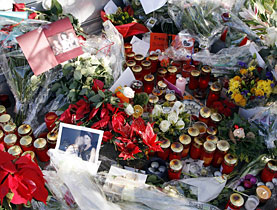
An army recruit has been sentenced to 17 years in jail after being found guilty of murdering a young woman by shooting her at random with his military-issue gun.
The sentence in the Hönggerberg case, as it is known was imposed by a Zurich court on Tuesday after a one-day trial. The prosecution had demanded 20 years, while the defence had called for 12 years maximum.
The Swiss army has since introduced a number of measures to stop such incidents happening again. A national vote is also due to be held on whether army guns should be stored at home.
On November 23, 2007, the man, then aged 21, had just finished training camp for new recruits to Switzerland’s militia army.
After stopping at home, he climbed a small hill in the Zurich Höngg district, taking with him his army-issue gun and some ammunition he admitted stealing from the camp.
The man then took aim at the 16-year-old victim, a trainee hairdresser, who just happened to be waiting at a nearby bus stop, as if in a computer game, reports say, and fired a fatal shot.
The trial, which had aroused huge public interest, was not held under military colours because the man went home before he carried out his attack.
In an interview in Monday’s Tages-Anzeiger newspaper, the parents of the dead girl – speaking for the first time – said that the accused had only shown remorse late in the day.
The couple believe that the army should take some responsibility, as the perpetrator was able to steal munitions and was allegedly known to the justice authorities.
“No gun should be given to this kind of person,” the father was quoted as saying.
Army and political action
The army has taken action since the incident, said Christoph Brunner, the deputy spokesman of the Swiss armed forces.
A pilot project at the Recruiting Centre in Sumiswald, one of six places where people undergo fitness and psychological assessments before being accepted into initial army training, has been carrying out personal security checks. These tests, to weed out security risks, are normally done after training is completed.
“We hope to be more efficient and faster in getting the results of personal security checks,” Brunner told swissinfo.ch. The results of the pilot project will be communicated soon.
Brunner said that the army had also ordered the cantons to take assault rifles away from 100 members of the Swiss armed forces.
A third measure allows a person with concerns over the psychological state of a relative to hand over their army rifle to the police.
In addition, last week the government announced plans to allow checks on any serving army staff member. This was previously banned for data protection reasons. The move still has to be approved by parliament.
“The army and the chief of the armed forces are in favour of every measure that can be of use so we don’t have another Hönggerberg,” Brunner said.
Nationwide vote
Tom Cassee, secretary of the pacifist Group for Switzerland Without an Army, believes more should be done. It is one of the groups behind a proposal on banning military firearms at home, which is slated for a nationwide vote next year.
“The army knows that there is immense pressure on them so they try and do tiny little steps but for us it’s clear it’s not enough at all,” he told swissinfo.ch.
Storing army rifles at home is a long-standing tradition for the militia army, to be ready for a call to arms in times of crisis. Around one million military weapons are estimated to be in circulation.
But most active members are no longer allowed to store munitions, following a decision by parliament two years ago. Ammunition is mainly kept in central arsenals.
Gun debate
Anti-gun campaigners argue that having guns at home is a safety risk, with Cassee adding that munitions were reportedly easy to steal or to declare lost.
Experts claim that around 300 deaths each year are caused by army weapons, which can also play a role in domestic violence and suicides.
Apart from the Hönggerberg case there has been a series of other highly publicised murders with army weapons over the past decade, including an attack on the Zug cantonal parliament in 2001 which left 14 people dead.
However, those in favour of keeping the tradition argue that decommissioning is a weakening of Swiss security and a vote of no confidence in soldiers.
A security study last year suggested that support for the practice was falling. It found that just 34 per cent of the population was in favour, compared with 57 per cent in 1989.
Isobel Leybold-Johnson, swissinfo.ch
Estimations of the number of firearms in circulation in Switzerland range upwards from 1.2 million. The anti-gun initiative committee puts the figure at 2.3 million.
Army-issue weapons are said to be involved in the deaths of more than 300 people in Switzerland every year.
According to Ipsilon Suicide Prevention, 34% of suicides among men are due to firearms, compared with only 3.7% of suicides among women.
Swiss gun laws are among the most liberal worldwide. Most army weapons are stored at home, but since the beginning of 2008, they can be kept in barracks in canton Geneva.
All able-bodied men aged 20-30 are conscripted for around three months and are issued with a rifle.
After initial training they are required to do up to four weeks of army service a year until they have served 260 days or reached the age of 34.
During the Cold War, the Swiss Army numbered 600,000 men who could be called up at short notice. In 1995 the army was reduced to 400,000 and today it is about 200,000, including 80,000 reserve troops.
Military service is optional for women and Swiss living abroad.

In compliance with the JTI standards
More: SWI swissinfo.ch certified by the Journalism Trust Initiative

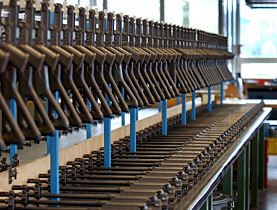
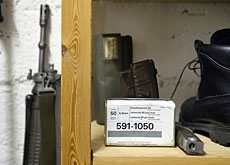
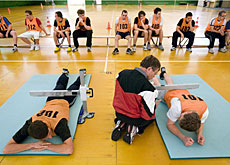
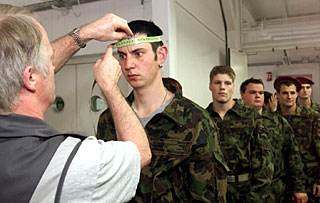
You can find an overview of ongoing debates with our journalists here. Please join us!
If you want to start a conversation about a topic raised in this article or want to report factual errors, email us at english@swissinfo.ch.